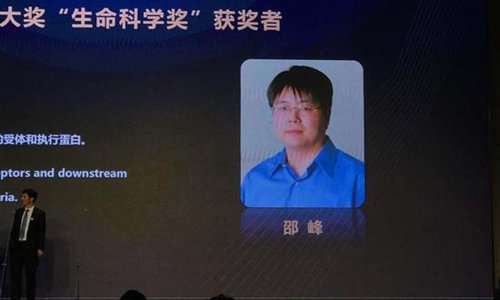China’s Future Science Prize announces 2019 winners
Source:Global Times Published: 2019/9/7 18:11:37

Photo: Weibo
Future Science Prize, China's first privately-funded scientific award, announced its 2019 winners in Beijing on Saturday, awarding $1 million in cash in each category to help promote basic research and encourage scientific talents in the country.
Shao Feng won the Prize in life sciences and was awarded with $1 million cash award for his seminal discoveries of cytosolic LPS receptors and downstream effectors in inflammatory responses to pathogenic bacteria.
Shao, a biochemist who is an academician of the Chinese Academy of Sciences and a senior research fellow of the National Institute of Biological Sciences, Beijing, has been conducting studies on the mutual effect mechanism between pathogenic bacteria and hosts and made a series of significant discoveries.
The prize committee said that Shao's studies not only shed new light on the understanding of innate immune mechanisms but also paved the way for designing potential new therapeutic strategies or vaccines for hard-to-treat bacterial infections and related diseases.
"I am honored that my work in China has been recognized, which is quite an encouragement for my team and myself and I hope it works as an incentive for other scientific research teams as well," said Shao.
Future Science Prize is the first privately-funded scientific award in China. It was established in 2015 to recognize those scientists whose original research conducted mostly in China in fields like life science, physics and mathematics, and computer science that has made a significant impact on the international science community, regardless of their nationality, gender, or age.
By promoting basic research and scientific talents in the region, the prize is set to inspire society's love for science, respect for scientists, and attention to scientific and technological developments, according to a statement sent to the Global Times by the prize committee on Saturday.
The cash award for the Future Science Prize in each category is $1 million, donated by four individual philanthropists to each of the category.
Wang Yifang and Luk Kam-biu won the Future Science Prize in physical sciences for the experimental discovery of a new type of neutrino oscillations. Wang Xiaoyun won the prize in mathematics and computer science, for her seminal contributions to cryptography by innovating cryptanalysis methods to reveal weaknesses of widely used hash functions.
Wang is the first female scientist who has won a Future Science Prize award.
Global Times
Posted in: CHINA FOCUS,SCI-TECH FOCUS